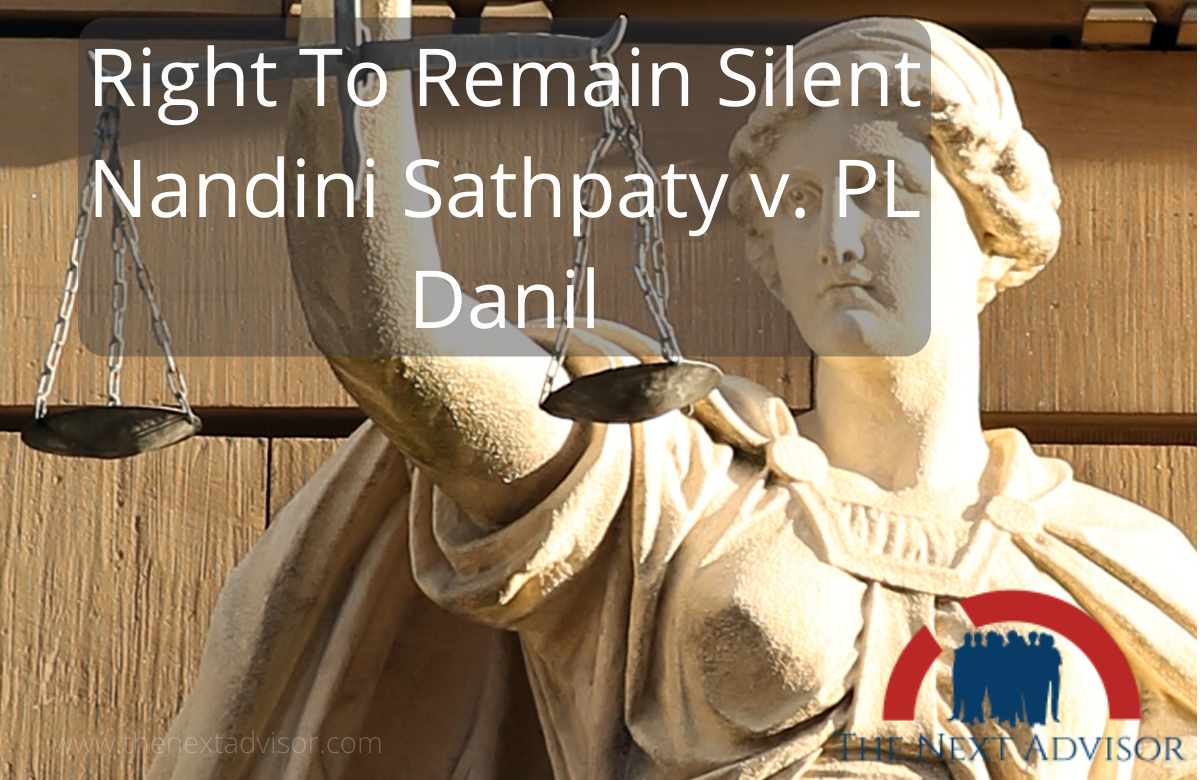The landmark judgment is sited in the name of Nandini Sapathy vs. P. L. Dani. This case speaks in a volume that the Right to Remain Silent is a fundamental right itself. Let us see the Right to Remain Silent as a Fundamental Right in this landmark judgment cited as Nandini Sathpaty Vs. P. L. Dani.
The former Chief Minister of Orissa Nandini Sathpathy was instructed to appear before the Police in Cuttack with regard to a vigilance case against her. She was provided with questions in relation to her alleged acquisition of disproportionate assets. She thereafter exercised her right under Article 20 (3) of the Constitution and refused to answer the questions.
Article 20 (3) of the Indian Constitution, Guarantees a Fundamental Right, is known as Doctrine of Self Incrimination. That no person shall be compelled to be a witness against himself or herself. Article 20 (3) gives us the Right to Remain Silent.
Upon her refusal to answer the questions, the Deputy Superintendent of Police filed a Complaint against her for refusal to answer as provided Under Section 179 of the Indian Penal Code.
She challenged a magistrate’s decision to issue her summons of appearance stating that Article 20 (3) and immunity Under Section 161 (2) of the Criminal Procedure Code ( not bound to answer questions that expose her to a criminal charge ) were wide enough to shield her. And she said that Right to Remain Silent is a Fundamental Right.
Section 161 of CRPC –
Such person shall be bound to answer truly all questions relating to such case put to him by such officer, other than questions the answers to which would have a tendency to expose him to a criminal charge or to a penalty or forfeiture.
When the High Court refused to entertain her Petition she appeal to the Supreme Court of India.
What were the questions before the Supreme Court?
-
What is the scope and meaning of Article 20 (3) in the Constitution as regards the term accused and compelled to be a witness against oneself?
-
What is the meaning and scope of Section 161 (2) of the Criminal Procedure Code?
-
Does Mens rea form a necessary component of Section 179 of the Indian Penal Code., and, if so, what is its precise nature? Can a mere apprehension that any answer has a guilty potential salvage the accused or bring it into play?
These three important questions were before the Honourable Apex Court. And most important thing is that What did the Honourable Apex Court Decide? or What was Court held in this case? And why the court considers the Right to Remain silent is a Fundamental Right.
The Court took a considerably wide view of the scope of Article 20 (3) holding that its prohibitive scope extends not only to the procedure in Court but also at the stage of the investigation. The ban on Self – Accusation is not confined to the offense regarding which interrogation is made but extends to other offences about which the accused has a reasonable apprehension of implication from his answer. Guarding against involuntary Self – Crimination in the face of pressure from Police officers, the Court found compelled testimony violative of Article 20 (3).
It read, Compelled testimony to mean evidence procured not only by physical threats and violence but also as psychic torture. Atmospheric pressure, environmental coercion, tiring interrogative proximity, overbearing and intimidatory methods. It also held that legal perils following upon refusal to answer or answer truthfully, cannot be regarded as compulsion within the meaning of Article 20 (3) of the Indian Constitution.
Article 20 (3) of the Constitution – (Right to Remain Silent)
The Indian Constitution provides immunity to an accused against self-incrimination under Article 20(3) – ‘No person accused of an offence shall be compelled to be a witness against himself. It is based on the legal maxim “Nemo teneteur produce access are seipsum”, which means “No man is obliged to be a witness against himself.”
The Court suggested the presence of a lawyer during the course of interrogation, as a solution to the problem of self – crimination secured through secrecy or coercion.
Now the question before Honourable Apex Court is whether the Mens rea is the essential element or not?
Mens rea is an essential ingredient of Section 179 of the Indian Penal Code ( refusing to answer public servant authorized to question ) Although an offence cannot be made under it in case there is an apprehension of implication on answering the questions put forth by the public authorities, an accused cannot deny to do the same on unreasonable and vague apprehensions and possibilities.
Section 179 of Indian Penal Code –
Refusing to answer public servant authorized to question.—Whoever, being legally bound to state the truth on any subject to any public servant, refuses to answer any question demanded of him touching that subject by such public servant in the exercise of the legal powers of such public servant, shall be punished with simple imprisonment for a term which may extend to six months, or with fine which may extend to one thousand rupees, or with both.
The Honorable Apex Court held that an accused was bound to answer where there is no clear tendency to criminate him. Now you have a better understanding of Section 179 of the Indian Penal Cond, Article 20 (3) of the Indian Constitution & also about Section 161 (2) of the Code of Criminal Procedure. And You also know that the Right to remain silent is a Fundamental Right and Nandini Sapathy vs. P. L. Dani is a landmark judgment that speaks in volume that the Right to remain silent is a Fundamental Right.



























